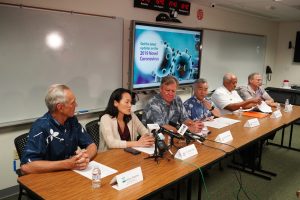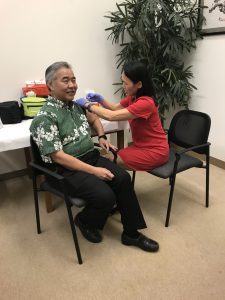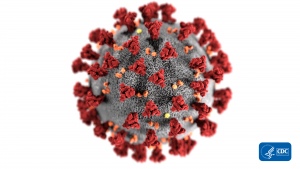State on high alert to protect against COVID-19
Posted on Feb 26, 2020 in Capitol Connection, Featured
State officials and community partners join Governor Ige at a news conference to provide coronavirus updates.
Wash your hands. Stay home if you’re sick. Get your information from reliable sources, such as the state Department of Health (DOH) and the Centers for Disease Control (CDC). All that sounds pretty basic, but in the case of the novel coronavirus (COVID-19), Hawai‘i health officials say it’s the best advice to reduce fear and prevent the spread of illness. They also recommend getting the seasonal flu shot to avoid confusion with the coronavirus, which has similar symptoms of fever, cough and shortness of breath.
COVID-19 has sickened thousands of people in China, with more cases being identified in the United States and other parts of the world. At press time, state officials were tracking the movements of one couple from Japan who had traveled to Maui and O‘ahu and tested positive for COVID-19 when they returned home. Governor Ige and health officials have stressed that while the risk to the state remains low, they continue to be on high alert. “We’re being proactive because we want to stay ahead of this,” the governor said. “We’re working very closely with the CDC and will keep everyone updated.”
The Daniel K. Inouye International Airport in Honolulu is one of 11 airports in the nation where select passengers traveling to the U.S. from China will be funneled, though direct flights from China to Hawai‘i have been suspended. These airports will only accept passengers from China who are U.S. citizens, legal permanent residents and their immediate family members. “We’re fortunate to have one of the CDC quarantine stations here in Hawai‘i to help us,” said state DOH director Bruce Anderson. “We’re recommending that people not travel to China at this time. This is a fast-moving issue, but it hasn’t stopped us from doing what we can.”
State epidemiologist Sarah Park has worked with the CDC before on global health emergencies and has twice received commendations as part of the CDC’s international team. Park supervises a staff of 75 investigators and epidemiologists whose job it is to keep the community safe. “The bottom line is we’re alert, aware and making sure we protect Hawai‘i,” she said.
So are these coronaviruses becoming more common? “It’s more a question of whether there are more ‘zoonotic’ infections — those coming over from the animal world to the human world,” said Park. “We have overpopulation, instantaneous travel from underdeveloped to developed countries. There’s more opportunity for these crossover events. We just have to be prepared. It’s a team effort.” To stay informed, go to the state Department of Health website at https://health.hawaii.gov/ or the CDC website at www.cdc.gov/nCoV. The public can also call 211 to ask questions.
Members of the public may sign up for daily updates from the Department of Health at: https://health.hawaii.gov/news/covid-19-updates/.

